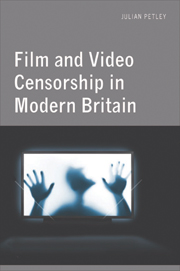Book contents
- Frontmatter
- Contents
- Acknowledgements
- Dedication
- Introduction
- Part I Censorious Rigmarole and Legalistic Overkill
- Part II After the Deluge
- Part III Nineties Nightmares
- 7 ‘Not Suitable for Home Viewing’
- 8 Vicious Drivel and Lazy Sluts
- 9 Doing Harm
- 10 The Anatomy of a Newspaper Campaign: Crash
- 11 The Last Battle, or Why Makin' Whoopee! Matters
- Part IV New Millennium, New Beginning?
- Appendix: The DPP List of ‘Video Nasties’
- Bibliography
- Index
9 - Doing Harm
from Part III - Nineties Nightmares
Published online by Cambridge University Press: 05 August 2013
- Frontmatter
- Contents
- Acknowledgements
- Dedication
- Introduction
- Part I Censorious Rigmarole and Legalistic Overkill
- Part II After the Deluge
- Part III Nineties Nightmares
- 7 ‘Not Suitable for Home Viewing’
- 8 Vicious Drivel and Lazy Sluts
- 9 Doing Harm
- 10 The Anatomy of a Newspaper Campaign: Crash
- 11 The Last Battle, or Why Makin' Whoopee! Matters
- Part IV New Millennium, New Beginning?
- Appendix: The DPP List of ‘Video Nasties’
- Bibliography
- Index
Summary
When politicians and press pundits work themselves into a self-righteous frenzy over films such as Natural Born Killers, Child's Play 3 and Crash you could easily be forgiven for thinking that Britain has entirely abolished film and video censorship.
Nothing could be further from the truth: Britain inflicts some of the strictest film and video censorship in the Western world. Between 1985 and 1995, the British Board of Film Classification cut 23.6 per cent of ‘18’-rated videos and 30.4 per cent of those rated ‘R18’. Forty were banned outright. Numerous recent films have suffered at the hands of the Board, in either their film or video versions or both, although it does need to be borne in mind that in some cases the cuts were inflicted so that the film or video could be given the specific classification for which the distributor had asked. The titles include Pulp Fiction, Dirty Weekend, the James Bond film Goldeneye, Batman Forever, Braveheart, Die Hard With a Vengeance, Under Siege 2, Judge Dredd, Mortal Kombat, Mighty Morphin Power Rangers, Showgirls, Strange Days, Highlander 3 and Rob Roy. The Good Son, which features a murderous child, and was held up for cinema classification in the wake of the James Bulger case (‘after a decent delay to let bruised memories fade’, as the BBFC Annual Report 1994–95 put it), was cut for video in 1995, although on its belated cinema release in summer 1994 it had been passed intact at ‘18’.
- Type
- Chapter
- Information
- Film and Video Censorship in Modern Britain , pp. 109 - 114Publisher: Edinburgh University PressPrint publication year: 2011



